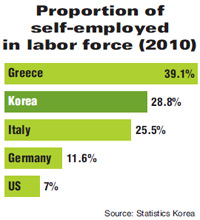Small biz struggle to make ends meet
Poor self-employed emerge as time bomb
Korea’s self-employed population is swelling like a balloon due to a decaying job market that has sidelined millions of people and forced them into starting their own businesses.
With economic activity squeezed to a pulp, there is a rapidly growing intersection between low-income earners, over-50 people and the self-employed, which policymakers fear could prove ground zero if there is a blow-up in financial stability in the country.
A Statistics Korea study published Wednesday revealed that the country’s 2.56 million small shops and companies each hiring less than five people in 2010 earned an average of 160 million won (about $139,000) in annual revenue and 27.37 million won in income after costs.
However, polarization was profound as half of these businesses, including supermarkets, bakeries, inns and fried chicken restaurants, failed to earn more than 50 million won in sales for the year.
Things are likely to be even tougher for small business owners now as it has been all downhill for the Korean economy after expanding by more than 6 percent in 2010.
The slowdown in recent months has triggered a vicious cycle spinning more people into self-employment in the face of collapsed consumption and financial turmoil. Economic activity among over-50 Koreans is revisiting all-time highs, but the choice is often between running on empty chasing scarce cash and marching blindly into retirement poverty.
While more than 1 million people take a leap into opening their own business or self-employment every year, this is nearly matched by the 800,000 small business owners who fail ever year, according to officials at the Ministry of Strategy and Finance, aggravating personal indebtedness levels that are already beyond dangerous.
Self-employed people accounted for 28.8 percent of Korea’s labor force in 2010, which represented the fourth-highest among the 34 advanced economies in the Organization for Economic Cooperation and Development (OECD), behind Turkey (39.1 percent), Greece (35.5 percent) and Mexico (34.3 percent). Korea’s proportion of self-employed people was roughly four times higher than the levels of the United States (7 percent) and Norway (7.7 percent).
“With the retiring of the so-called baby boom generation, referring to those born in the mid-1950s to early-1960s, just beginning, the country’s self-employed population will only grow. The majority of Korea’s older workers are failing to make adequate provisions for retirement, and will need to earn income before they reach the age eligible for pension payments,’’ said Kang Seon-gu, an economist from the LG Economic Research Institute.
“The biggest problem is that the country’s economy and job market are providing no options to older workers and retirees other than to take a gamble by starting their own business. Most of these people are involved in low-margin businesses like eateries and local stores, which are more vulnerable in times like these, and the huge number of over-50 business owners who are failing is alarming as they won’t likely be getting a second chance.’’
The Bank of Korea (BOK) puts the household debt mountain at 912.9 trillion won (about $791 billion) based on data from savings institutions and other financial companies. When combing the borrowing from self-employed people, the total grows to over 1.1 quadrillion won, compared to the 1.2 quadrillion won the economy made last year.
The official unemployment rate was measured at 3.1 percent in May, down from 3.5 percent in April and 3.2 percent in the same month a year earlier. More than 472,000 jobs were created last month, up from 455,000 positions added to payrolls in April.
However, the headline rate is hardly a meaningful indicator when around 15.6 million of Korea’s 41.5 million people above the age of 15 are deemed as “economically inactive’’ as they are neither working nor looking for work. The economically inactive population has bloated in recent years because of the increasing number of people shaved off payrolls and those forced into self-employment.
According to the Statistics Korea report, the small businesses hiring less than five employees accounted for more than 76 percent of the country’s 3.35 million listed businesses in 2010. These small businesses generated a combined 270 trillion won in sales, accounting for just more than 6 percent of the entire business sector revenue of 4.33 quadrillion won.
Franchised fried chicken restaurants fared better than other businesses run by self-employed people, with the operating profit rate at these shops measured at over 30 percent. <The Korea Times/Kim Tong-hyung>




















































